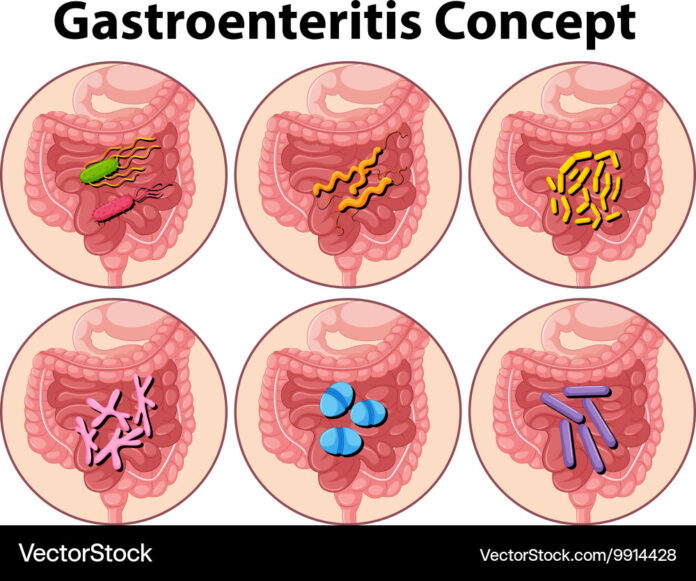An infection or inflammation of the digestive tract can cause gastroenteritis. Symptoms such as vomiting, diarrhea, and cramping in the abdomen are common. With gastroenteritis, the illness frequently goes away on its own in a matter of days.
Dehydration is the primary side effect of gastroenteritis, although it can be avoided if the fluid lost through vomiting and diarrhea is replaced. Hydration supplied intravenously (i.e., straight into the bloodstream via a vein; this configuration is sometimes known to as a “drip”) may be necessary for an individual experiencing acute gastroenteritis. Viruses, bacteria, bacterial toxins, parasites, certain chemicals, and some medications are among the causes of gastroenteritis.
Symptoms of gastroenteritis
The symptoms of gastroenteritis can include:
- loss of appetite
- bloating
- nausea
- vomiting
- abdominal cramps
- abdominal pain
- diarrhoea
- bloody stools (poo) – in some cases
- pus in the stools – in some cases
- generally feeling unwell – including lethargy and body aches.
Causes of gastroenteritis
There are many things that can cause gastroenteritis, including:
- viruses – such as norovirus, calicivirus, rotavirus, astrovirus and adenovirus
- bacteria – such as the Campylobacter bacterium
- parasites – such as Entamoeba histolytica, Giardia lamblia and Cryptosporidium
- bacterial toxins – the bacteria themselves don’t cause illness, but their poisonous by-products can contaminate food. Some strains of staphylococcal bacteria produce toxins that can cause gastroenteritis
- chemicals – lead poisoning, for example, can trigger gastroenteritis
- medication – certain medication (such as antibiotics), can cause gastroenteritis in susceptible people.
Infectious gastroenteritis
Infectious gastroenteritis is caused by viruses, bacteria or parasites. In each case, infection occurs when the agent is ingested, usually by eating or drinking. Some of the common types of infectious gastroenteritis include at Gastroenteritis:
- Escherichia coli infection – this is a common problem for travellers to countries with poor sanitation. Infection is caused by drinking contaminated water or eating contaminated raw fruits and vegetables.
- Campylobacter infection – the bacteria are found in animal faeces (poo) and uncooked meat, particularly poultry. Infection is caused by, for example, consuming contaminated food or water, eating undercooked meat (especially chicken), and not washing your hands after handling infected animals.
- Both human and animal intestines have parasites known as Cryptosporidium infections. For instance, swimming in a contaminated pool and unintentionally ingesting water, or coming into contact with diseased animals, can result in infection. If an infected individual with gastroenteritis doesn’t wash their hands after using the restroom, they could transfer the parasites to food or surfaces.
- Giardiasis – parasite infection of the bowel. Infection is caused by, for example, drinking contaminated water, handling infected animals or changing the nappy of an infected baby and not washing your hands afterwards.
- Salmonellosis – bacteria are found in animal faeces. Infection is caused by eating contaminated food or handling infected animals. An infected person may also spread the bacteria to other people or surfaces by not washing their hands properly at Gastroenteritis.
- Shigellosis – bacteria are found in human faeces. An infected person may spread the bacteria to food or surfaces if they don’t wash their hands after going to the toilet.
- Viral gastroenteritis – infection is caused by person-to-person contact such as touching contaminated hands, faeces or vomit, or by drinking contaminated water or food at Gastroenteritis.
Diagnosis of gastroenteritis
It is important to establish the cause, as different types of gastroenteritis respond to different treatments. Diagnostic methods may include at Gastroenteritis:
- medical history
- physical examination
- blood tests
- stool tests.
Treatment for gastroenteritis
Treatment depends on the cause, but may include:
- Plenty of fluids.
- Oral rehydration drinks, available from your pharmacist.
- Admission to hospital and intravenous fluid replacement, in severe cases at Gastroenteritis.
- Antibiotics, if bacteria are the cause.
- Drugs to kill the parasites, if parasites are the cause.
- Avoiding anti-vomiting or anti-diarrhoea drugs unless prescribed or recommended by your doctor, because these medications will keep the infection inside your body.
Prevention of gastroenteritis
Good old-fashioned handwashing with soap and water is still the best defence against spreading the bug.
Gastroenteritis is highly contagious, general suggestions on how to reduce the risk of infection include:
- Stay home while sick, until 48 hours after symptoms have stopped. If symptoms persist, visit your GP.
- Wash hands thoroughly with soap and water after going to the toilet or changing nappies, after smoking, after using a handkerchief or tissue, or after handling animals at Gastroenteritis.
- Wash your hands thoroughly with soap and water before preparing food or eating.
- Use disposable paper towels to dry your hands rather than cloth towels, since the bacteria can survive for some time on objects.
- Do not handle raw and cooked foods with the same implements (tongs, knives, cutting boards), unless they have been thoroughly washed between uses.
- Keep all kitchen surfaces and equipment clean.
- Keep cold food cold (below 5 °C) and hot food hot (above 60 °C) to discourage the growth of bacteria.
- Make sure foods are thoroughly cooked.
- Clean kitchen tops, toys, toilet seats, nappy change tables and taps to ensure you don’t spread the infection to others at home at Gastroenteritis.
- Clean the toilet and bathroom regularly (especially the toilet seat, door handles and taps).
- Clean baby change tables regularly.
- When travelling overseas to countries where sanitation is suspect, only drink bottled water. Don’t forget to brush your teeth in bottled water too. Avoid food buffets, uncooked foods or peeled fruits and vegetables, and ice in drinks.
Note: Wash hands with soap and water as this is the best way to prevent infection. Alcohol-based hand sanitisers while effective against some viruses (such as coronavirus), are not effective against gastroenteritis at Gastroenteritis.

